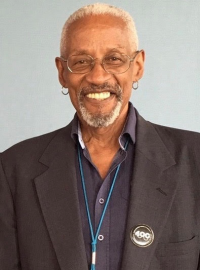Robert E Fullilove, EdD
- Professor of Sociomedical Sciences (in Social Work) at CUMC
- Adjunct Full Professor, Teachers College
On the web

Overview
Robert E. Fullilove, EdD is the Associate Dean for Community and Minority Affairs, Professor of Clinical Sociomedical Sciences and the co-director of the Cities Research Group.
Dr Fullilove has authored numerous articles in the area of minority health. From 1995 to 2001, he served on the Board of Health Promotion and Disease Prevention at the Institute of Medicine (IOM) at the National Academy of Sciences. Since 1996, he has served on five IOM study committees that have produced reports on a variety of topics including substance abuse and addiction, HIV/AIDS, tuberculosis, and damp indoor spaces and health. In 2003 he was designated a National Associate of the National Academies of Science. In 1998 he was appointed to the Advisory Committee on HIV and STD Prevention (ACHSP) at the Centers for Disease Control, and in July, 2000, he became the committee's co-chair. Finally, between 2004-2007, he served on the National Advisory Council for the National Center for Complementary and Alternative Medicine at the National Institutes of Health [NIH]. Since 2010, he has been teaching public health courses in six New York State prisons that are part of the Bard College Prison Initiative (BPI) and serves as the Senior Advisor to BPI's public health program.
Dr Fullilove serves on the editorial boards of the journals Sexually Transmitted Diseases, and the Journal of Public Health Policy. He has been awarded the Distinguished Teaching Award at the Mailman School of Public Health three times (in 1995, 2001, and 2013), and in May, 2002, he was awarded an honorary doctorate from Bank Street College of Education.
Academic Appointments
- Professor of Sociomedical Sciences (in Social Work) at CUMC
- Adjunct Full Professor, Teachers College
Administrative Titles
- Associate Dean, Community and Minority Affairs
Credentials & Experience
Education & Training
- BA, 1966 Colgate University
- MS, 1972 Syracuse University
- EdD, 1984 Teachers College, Columbia University
Committees, Societies, Councils
National Associate of The National Academies of Science
CDC/HRSA HIV/AIDS Advisory Committee (CHAC) 1998-2004
Board on Health Promotion/Disease Prevention, IOM 1995-2002
Council, National Center for Complementary and Alternative Medicine, NIH 2004 -present
Adjunct Professor of Health Education, Teachers College, Columbia University
Editorial Boards
Sexually Transmitted Diseases
Journal of Public Health Policy
Honors & Awards
Picker Commonwealth Scholar 1996
Award for Teaching Excellence 1994, 2001
Doctor of Humane Letters, Honoris Causa, Bank Street College 2002
National Associate of the National Academies, 2003
Rev. Dr. Preston R. Washington Visionary Award 2003
Research
Public health is more than just a gesture -- you actually want the gesture to work.
Research Interests
- Community Health
- HIV/AIDS
- Substance Use Disorders
- Urban Health
Selected Publications
Golembeski C, Fullilove R Criminal (in)justice in the City and Its Associated Health Consequences. American Journal of Public Health 95 1701-6 2005
Green LL, Fullilove MT, Fullilove, RE. Remembering the Lizard: Reconstructing Sexuality in the Rooms of Narcotics Anonymous. Journal of Sex Research 42 28-34 2005
Malebranch DJ, Peterson JL, Fullilove RE, Stackhouse RW. Race and Sexual Identity: Perceptions about Medical Culture and Healthcare among Black Men Who Have Sex with Men. Journal of the National Medical Association 96 97-107 2004
Levine RS, Foster JE, Fullilove RE et al. Black-White Inequalities in Mortality and Life Expectancy, 1993-1999 :Implications for Healthy People 2010. Public Health Reports 116 474-83 2001
Fullilove RE HIV Prevention in the African American Community: Why Isn't Anybody Talking about the Elephant in the Room? AIDScience 1 1-7 2001
Fullilove MT and Fullilove RE What's housing got to do with it? American Journal of Public Health 90 183-4 2000
Fullilove RE, Green LL, Fullilove MT The Family to Family Program: A Structural Intervention with Implications for the Prevention of HIV/AIDS and Other Community Epidemics. AIDS. Vol 14 (1S) 2000.63-67 14(1S) 63-67 2000
Burns, D Learning for Our Common Health Association of American Colleges and Universities Washington, DC 109-119 1999
Global Health Activities
Conservatoire National des Arts et Metiers: I am part of a team that works with the emeritus chair of the Department of Urbanism and the Environment at CNAM. Our work involves examining the relationship between urban areas, the built environment, social cohesion, and health
Le Bateau Pedagogique: To assist the work of an organization in Nantes, France to construct a replica of a ship used in the transport of captives from Africa to French colonies in the Western Hemisphere and subsequently, to transport goods from the New World to France. The "teaching ship" will be used to keep alive the memory of the slave trade in the world - both past and present - and to animate discussions about how to confront and end slavery in the modern age.
